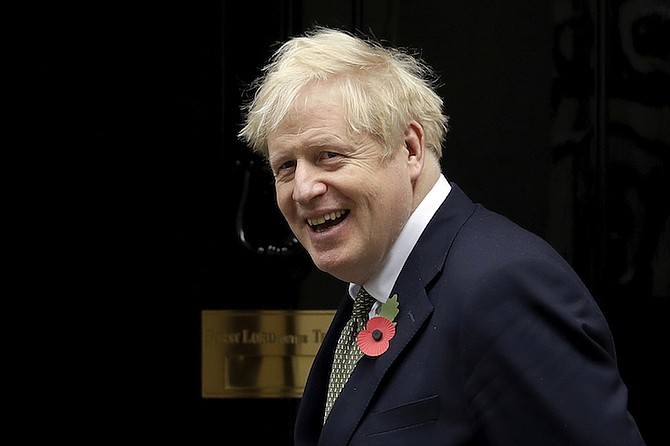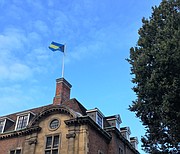NO doubt to the consternation of many, Brexit is back in the news again this week. After endless controversy and bickering since the British people voted in the 2016 referendum by a small majority to leave the European Union, most people have become justifiably tired of the issue and anyway probably thought it had been settled. But, the agreed transition period is not yet over. So, over the last months and with comparatively little publicity, there has been considerable activity to secure a trade deal and complete the whole Brexit process.
Following Britain’s formal departure from the EU on January 31 this year, during the transition period which is due to end on December 31 there have been intensive negotiations about the detailed arrangements for the UK’s future relationship with the EU. These are, of course, inherently important and the top priority remains a UK/EU trade deal, though discussions have also covered issues like security and fishing rights. However, these talks have now stalled.
The 27-member EU is one of Britain’s major trading partners with which, as a newly independent country, it wants a deal. Clearly, it is in the interests of both sides to achieve one. But several sticking points in the negotiations remain and it now appears that, if these differences cannot be resolved soon, there is a growing possibility of the British side walking away without an agreement.
Both sides had wanted to secure a deal by October 15 to provide time for it to be ratified before the end of the transition period. Having missed that mid-October deadline, talks have now gone into overdrive, producing another cliffhanger characteristic of EU negotiations, with the two sides meeting again over the past weekend as well as this week after Mr Johnson had earlier called a temporary halt to the talks because of the EU’s alleged refusal to compromise. At the time of writing, no progress has been made public.
An obvious option would be to extend the transition period. But Prime Minister Boris Johnson has ruled that out because of fear the negotiations might drag on indefinitely which could even result in abandonment of Brexit altogether and another referendum. What is more, there is evidence that this is what the EU – in alliance with the so-called ‘Remainers’ in Britain – would prefer. So Mr Johnson has dug his heels in and insisted that, if there is no deal before the end of the transition period, the UK will operate on World Trade Organisation terms from January 1, 2021, with tariffs and border checks in place. He has a mandate for this tough approach since his overwhelming victory in December’s General Election was based on a pledge “to get Brexit done”.
In studying why the trade talks have stalled, it is interesting to look at the EU’s approach in dealing with the departure of one of its major players. Some commentators suggest its aim is both to punish Britain for its impertinence in challenging the EU’s federalist dogma by voting to leave and also to deter other member states from following suit. So, they say, in ignoring the democratic will of the British people and thwarting their majority wish for a return to full sovereignty, Brussels has been trying to make the UK’s departure as difficult as possible – and, in the view of many, is seeking to continue to maintain control over the newly-independent UK even after it has left the bloc.
One example of that is the EU’s insistence on what it calls a level playing field to ensure fair competition but which is widely seen as an attempt to force the UK to adhere to EU regulations; for example, in relation to financial subsidies. Another is to try to retain a role for EU institutions to settle disputes. Britain sees such demands as unacceptable to a sovereign country and show the EU’s disdain for the very concept of independence.
The other major sticking point in the negotiations concerns fisheries. Under the Common Fisheries Policy, the Exclusive Economic Zones of EU member states are merged into one large zone which can be accessed by fishermen from all states and regulated by the CFP. Now, the EU wants to keep control over British waters within the CFP. The UK, for its part, insists that as an independent nation it must be in full control of its own waters and, if EU countries want to fish in UK waters, they will have to request access through quotas agreed in annual negotiations. But such a system is opposed by France, in particular, and remains under discussion with a view to seeking some sort of compromise.
It seems to me that, while the EU has been creating obstacles to an agreement, it must be clear to all that the British government is asking for no more than a trade deal like any other independent nation doing business with the EU and similar to what the Prime Minister has called “nothing more complicated than a Canada-style relationship based on friendship and free trade”.
With fisheries a major stumbling block, Britain has said firmly that failure to be able to take back control of its own waters would be a sellout and has demanded a change in the EU’s negotiating position. There is some sign of movement with a recent statement by Germany’s Chancellor Merkel that the EU must accept the principle that any deal must be in the interests of both parties. Moreover, reportedly, some EU member states are now concerned about a no deal outcome and the effect on their economies of a switch to tariffs under WTO terms. So it remains to be seen whether there will be any progress in the talks this week. But Brexit is certainly back on the front pages.
Thank God this has been a quiet month
In writing last week about the significance of October, there was no space to mention the extraordinary number and range of events of military importance that have taken place during this month over the years.
I found it interesting to do an internet search which turned out to be remarkably revealing. The list is long but a few stand out – for example, the surrender of British general Lord Charles Cornwallis to George Washington at Yorktown, Virginia, ending the American War of Independence in 1781; the Battle of Trafalgar in 1805; the famous Charge of the Light Brigade in the Crimean War in 1854; and, more recently, the ill-advised and fateful Suez Canal campaign and invasion of Egypt in 1956. Finally, there was the Yom Kippur (Day of Atonement) War in October, 1973 – this was also known as the 1973 Arab-Israeli War, fought by a coalition of Arab states led by Egypt and Syria against Israel, at the conclusion of which both sides claimed success after the latter’s victory in the Seven-Day War of 1967.
Significant as all these were, however, perhaps none can compare with what historians regard as the most important event of all – at least in the 20th century; namely, the Cuban missile crisis of 1962 which reached a peak in October that year. After a lengthy standoff with Washington, and under intense pressure from President Kennedy, the Soviet leader, Khrushchev, finally withdrew the medium-range missiles – earlier installed by the USSR in Cuba – which had posed a direct threat to the US mainland. Although Kennedy had to make concessions like the withdrawal of the US’s own missiles in Turkey and agreement not to invade Cuba, he was much praised at the time for his handling of the crisis.
In his work published in 2003, one of Kennedy’s biographers, Robert Dallek, wrote that 40 years after the event historians almost uniformly agreed that this was the most dangerous moment in the 45-year Cold War and could have led to nuclear annihilation. The US was on the brink of taking military action against Cuba and, combined with existing conflict over Berlin, this could have led to war with the Soviet Union. In Dallek’s words, Kennedy’s “restraint in resisting a military solution that would almost certainly have triggered a nuclear exchange makes him a model of wise statesmanship in a dire situation”.
A flag flies proudly
I am indebted to a friend for bringing to my attention a memorable story about a famous Bahamian’s involvement in Cambridge University.
On October 1, St Catherine’s College, Cambridge flew the national flag of The Bahamas above the city centre, pictured, to signify the start of a programme of activities to celebrate Black History Month in the UK – and it will be flown again on October 31.
The flag was raised to mark the College’s connections with The Bahamas and, specifically, in honour of its earliest black student on record, Alfred F Adderley, who arrived to study law there in 1912 and who, of course, subsequently had a brilliant career, including becoming Acting Chief Justice of The Bahamas. Many people are aware of the details of his life and work after returning home since they are well documented. But what may be little known is that he contributed much to life at St Catherine’s and established the Adderley Prize – jointly with his son, former Cabinet minister, Attorney General and Acting Governor General of The Bahamas, Paul L Adderley, who also studied at the College. This prize is given annually to recognise St Catherine’s law students for outstanding performance in their examinations.
In comments marking Black History Month and the start of a new academic year, the Master of St Catherine’s emphasised how much the College appreciated overseas students and mentioned, in particular, Alfred F Adderley and his contribution to the life of the College.
This is a heart-warming tale and many will surely find it uplifting to read about such a fine tribute to the Adderley family.







Comments
Use the comment form below to begin a discussion about this content.
Sign in to comment
OpenID